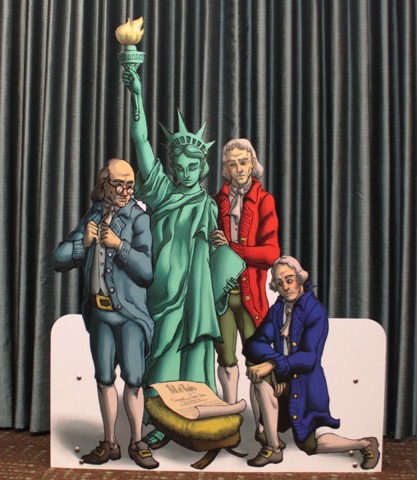 The Freedom From Religion Foundation has been granted permanent relief in its six-year lawsuit challenging Gov. Greg Abbott’s censorship of its Winter Solstice display in the Texas Capitol.
The Freedom From Religion Foundation has been granted permanent relief in its six-year lawsuit challenging Gov. Greg Abbott’s censorship of its Winter Solstice display in the Texas Capitol.
U.S. District Court Judge Lee Yeakel ruled in favor of FFRF in its federal challenge of censorship of its freethought display in the Capitol in 2015. Yeakel ordered declaratory and injunctive relief to ensure that Abbott and the State Preservation Board will not violate FFRF’s free speech rights in the future.
The court, after officially rendering its verdict in favor of FFRF’s First Amendment freedom-of-speech claim, granted it protection from future viewpoint censorship and issued an injunction and this declaration:
IT IS FURTHER ORDERED AND DECLARED that defendants violate the Foundation’s First Amendment rights and engage in viewpoint discrimination as a matter of law when they exclude the Foundation’s exhibit based on the perceived offensiveness of its message.
FFRF, with help from members and with requisite sponsorship by a legislator, had placed a Winter Solstice display in the state Capitol in December 2015 as a response to a Christian nativity. FFRF’s whimsical display depicted the Founders and the Statue of Liberty celebrating the “birth” of the Bill of Rights (which was adopted on Dec. 15, 1791). Abbott, as chair of the Texas State Preservation Board, while permitting the Christian exhibit, ordered FFRF’s display removed only three days after it was erected, lambasting it as indecent, mocking and contributing to public immorality.
FFRF initially won its lawsuit at the district court level, which ruled that Abbott and the State Preservation Board had violated FFRF’s free speech rights. In April 2020, the 5th U.S. Circuit Court of Appeals ruled that FFRF was entitled to more permanent, lasting relief than the district court initially awarded, and sent the case back to that court to award such relief. Today, the district court granted FFRF prospective relief by enjoining Abbott and the board from censoring FFRF’s speech in the future.
Abbott has long demonized atheists and the Freedom From Religion Foundation, going so far as to warn FFRF “not to mess with Texas.”
“In fact it was Abbott who ‘messed’ with free speech,” comments Annie Laurie Gaylor, FFRF co-president. “If governmental bodies create public forums, they cannot then censor unpopular or minority points of view.”
Gaylor notes that today the fastest-growing segment of the population are the “Nones” — religiously unaffiliated Americans. FFRF has almost 1,500 members in Texas.
FFRF’s relief was greatly delayed, thanks to a stunt pulled by the State Preservation Board. Two weeks before the parties’ briefs were due to the district court, the board made slight adjustments to its exhibit policies, including a dubious declaration that all future exhibits in the Capitol would be considered “government speech.” In its subsequent briefing to the district court, FFRF successfully argued that these surface-level changes did not alter the true nature of the forum for citizen speech in the Texas Capitol. The court rejected the state’s argument that FFRF’s lawsuit no longer involved a live controversy and that the case was thus moot.
“This is a great victory for free speech rights, especially of minority viewpoints, including nonreligious citizens whose voices must be equally respected,” says FFRF Legal Director Rebecca Markert.
FFRF is represented by Associate Counsel Sam Grover and Senior Counsel Patrick Elliott in the case, with attorney Rich Bolton of Boardman and Clark LLP serving as litigation counsel.
The Freedom From Religion Foundation is a national nonprofit organization with more than 35,000 members and several chapters across the country, including nearly 1,500 members and a chapter in Texas. Its purpose is to protect the constitutional principle of separation between state and church.

